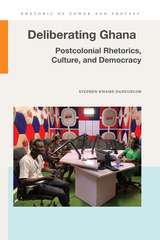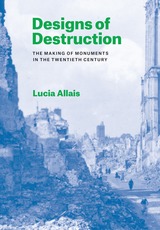18 start with C start with C

Interviewing 120 software developers from leading tech firms, Papadantonakis shows how temporary contracts, project cancellations, and company downsizing undermine the security of even highly skilled professionals. He also highlights the systemic inequalities that shape the tech industry, showing how age, race, and gender often dictate the opportunities and responsibilities software developers have—or are denied.
Canaries in the Code Mine highlights a disturbing reality of privilege and vulnerability within the tech industry. Papadantonakis engages in a critical discourse on the evolving nature of work in the digital era, emphasizing the need to shape an equitable future in the rapidly evolving landscape.
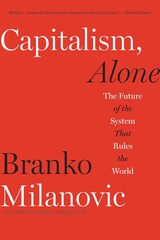
An Economist Book of the Year
A Financial Times Book of the Year
A Foreign Affairs Best Book of the Year
A Prospect Best Book of the Year
A ProMarket Book of the Year
An Omidyar Network “8 Storytellers Informing How We’ve been Reimagining Capitalism” Selection
“Brilliant…Poses all the important questions about our future.”
—Gordon Brown
“A scholar of inequality warns that while capitalism may have seen off rival economic systems, the survival of liberal democracies is anything but assured.”
—The Economist
We are all capitalists now. For the first time in human history, the world is dominated by one economic system. At some level capitalism has triumphed because it works: it delivers prosperity and gratifies our desire for autonomy. But this comes at a moral price, pushing us to treat material success as the ultimate goal, and offers no guarantee of stability. While Western liberal capitalism creaks under the strains of inequality and excess, some are flaunting the virtues of political capitalism, exemplified by China, which may be more efficient, but is also vulnerable to corruption and social unrest.
One of the outstanding economists of his generation, Branko Milanovic mines the data to tell his ambitious and compelling story. Capitalism gets a lot wrong, he argues, but also much right—and it isn’t going away anytime soon. Our task is to improve it in the hopes that a more equitable capitalism can take hold.
“Erudite, illuminating…Engaging to read…As a virtuoso economist, Milanovic is superb when he is compiling and assessing data.”
—Robert Kuttner, New York Review of Books
“Leaves little doubt that the social contract no longer holds. Whether you live in Beijing or New York, the time for renegotiation is approaching.”
—Edward Luce, Financial Times
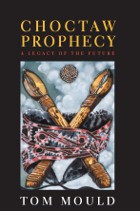
Explores the power and artistry of prophecy among the Mississippi Band of Choctaw Indians, who use predictions about the future to interpret the world around them
This book challenges the common assumption that American Indian prophecy was an anomaly of the 18th and 19th centuries that resulted from tribes across the continent reacting to the European invasion. Tom Mould’s study of the contemporary prophetic traditions of the Mississippi Band of Choctaw Indians reveals a much larger system of prophecy that continues today as a vibrant part of the oral tradition.
Mould shows that Choctaw prophecy is more than a prediction of the future; it is a way to unite the past, present, and future in a moral dialogue about how one should live. Choctaw prophecy, he argues, is stable and continuous; it is shared in verbal discourse, inviting negotiation on the individual level; and, because it is a tradition of all the people, it manifests itself through myriad visions with many themes. In homes, casinos, restaurants, laundromats, day care centers, and grocery stores, as well as in ceremonial and political situations, people discuss current events and put them into context with traditional stories that govern the culture. In short, recitation is widely used in everyday life as a way to interpret, validate, challenge, and create the world of the Choctaw speaker.
Choctaw Prophecy stands as a sound model for further study into the prophetic traditions of not only other American Indian tribes but also communities throughout the world. Weaving folklore and oral tradition with ethnography, this book will be useful to academic and public libraries as well as to scholars and students of southern Indians and the modern South.

Chris Marker is the first systematic examination of Marker's complete oeuvre. Here, Catherine Lupton traces the development and transformation of the artist's work from the late 1940s, when he began to work as a poet, novelist, and critic for the French journal Esprit, through the 1990s and the release of his most recent works, including Level Five and the CD-ROM Immemory. Lupton explicates Marker's work as a circular trajectory, with each project recycling and referring back to earlier works as well as to a host of adopted texts, always proceeding by oblique association and lateral digression. This trajectory, which Lupton outlines with great care and precision, is critical to understanding Marker's abiding obsession: the forms and operations of human memory. With this theme as her architecture, Lupton presents the most comprehensive and incisive analysis of Marker to date.
Incorporating historical events and cultural contexts that have informed each phase of Marker's career, Lupton gives readers access to an artist who stands outside of the mainstream and thus defies easy explanation. There is no better guide than Lupton's to this modern master's prolific and multidimensional career.
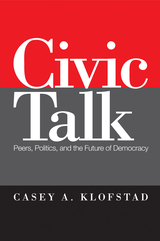
Does talking about civic issues encourage civic participation? In his innovative book, Civic Talk, Casey Klofstad shows that our discussions about politics and current events with our friends, colleagues, and relatives—"civic talk"—has the ability to turn thought into action—from voting to volunteering in civic organizations.
Klofstad’s path breaking research is the first to find evidence of a causal relationship between the casual chatting and civic participation. He employs survey information and focus groups consisting of randomly assigned college freshman roommates to show this behavior in action. Klofstad also illustrates how civic talk varies under different circumstances and how the effects can last years into the future. Based on these findings, Klofstad contends that social context plays a central role in maintaining the strength of democracy. This conclusion cuts against the grain of previous research, which primarily focuses on individual-level determinants of civic participation, and negates social-level explanations.

Unlike our daily reckoning with the weather, our experience of climate must be mediated through tools that record the ebb and flow of climate over millions of years, such as computer models, instruments like thermometers, and organic and inorganic remains. Climate by Proxy by Melissa Charenko explores how scientists read the record of past climates and how their readings have engendered particular understandings of climate. Charenko focuses on the twentieth century, a period when scientists in Europe and North America began to believe that climate had a dynamic history worth studying. Scientists in this period developed several techniques to infer past climate from fossil pollen, tree rings, pieces of vegetation, and other organic remains imprinted upon by former climates. Climate by Proxy examines how these techniques helped shape notions of climate itself.
Charenko also shows how these varied interpretations of climate played an outsized role in explanations of human history and destiny. Geologists, botanists, ecologists, and other scientists interested in climate over long timescales routinely discussed how climate influenced plants, animals, and, notably, people. By following the scientists who reconstructed climate using the natural archives, Climate by Proxy demonstrates how material objects worked with scientists’ perceptions of human groups to compel, constrain, and reinforce their understandings of climate, history, and the future.
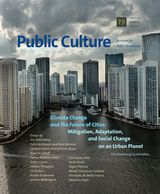
We live in the age of extremes, a period punctuated by significant disasters that have changed the way we understand risk, vulnerability, and the future of communities. Violent ecological events such as Superstorm Sandy attest to the urgent need to analyze what cities around the world are doing to reduce carbon emissions, develop new energy systems, and build structures to enhance preparedness for catastrophe. The essays in this issue illustrate that the best techniques for safeguarding cities and critical infrastructure systems from threats related to climate change have multiple benefits, strengthening networks that promote health and prosperity during ordinary times as well as mitigating damage during disasters. The contributors provide a truly global perspective on topics such as the toxic effects of fracking, water rights in the Los Angeles region, wind energy in southern Mexico, and water scarcity from Brazil to the Arabian Peninsula.
Contributors: Nina Berman, Dominic Boyer, Daniel Aldana Cohen, Gökçe Günel, Cymene Howe, Colin Jerolmack, Eric Klinenberg, Liz Koslov, Andrew Lakoff, Valeria Procupez, Jerome Whitington, Austin Zeiderman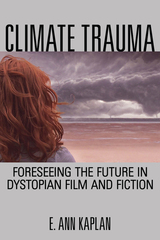
Drawing from recent scholarship that analyzes climate change as a form of “slow violence” that humans are inflicting on the environment, Climate Trauma theorizes that such violence is accompanied by its own psychological condition, what its author terms “Pretraumatic Stress Disorder.” Examining a variety of films that imagine a dystopian future, renowned media scholar E. Ann Kaplan considers how the increasing ubiquity of these works has exacerbated our sense of impending dread. But she also explores ways these films might help us productively engage with our anxieties, giving us a seemingly prophetic glimpse of the terrifying future selves we might still work to avoid becoming.
Examining dystopian classics like Soylent Green alongside more recent examples like The Book of Eli, Climate Trauma also stretches the limits of the genre to include features such as Blindness, The Happening, Take Shelter, and a number of documentaries on climate change. These eclectic texts allow Kaplan to outline the typical blind-spots of the genre, which rarely depicts climate catastrophe from the vantage point of women or minorities. Lucidly synthesizing cutting-edge research in media studies, psychoanalytic theory, and environmental science, Climate Trauma provides us with the tools we need to extract something useful from our nightmares of a catastrophic future.

The Clinton scandal consumed the better part of a year of American public life, bitterly dividing the nation and culminating in a constitutional crisis. In this book, thoughtful, nonpartisan essays provide an insightful and lasting analysis of one of the major political events of our time.
Here leading scholars explore the long-reaching constitutional and political implications of the scandal: how it will affect the presidency, the law, and the political process. A first group of chapters considers effects of the scandal on institutions: the presidency, Congress, the courts, the independent counsel statute, executive privilege, and the impeachment process itself. A second section addresses political factors: public opinion, the media, and presidential character and personality. A concluding essay broadly examines the implications of the scandal for governance.
These far-reaching essays address such issues as risks posed to Congressional political careers, the prospect of future presidents being subject to civil suits, the pros and cons of Kenneth Starr's investigation, the role of the media in breaking and then shaping the story, and ways of reforming the system to handle the unacceptable private behavior of future presidents.
A provocative book for readers concerned with how our government copes with such a challenge, and an essential reader for courses on the presidency or American government, this collection will stand the tests of both time and rigorous analysis.
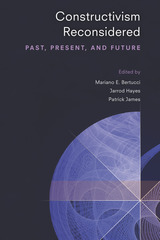
Constructivism Reconsidered synthesizes the nature of and debates on constructivism in international relations, providing a systematic assessment of the constructivist research program in IR to answer specific questions: What extent of (dis)agreement exists with regard to the meaning of constructivism? To what extent is constructivism successful as an alternative approach to rationalism in explaining and understanding international affairs? Constructivism Reconsidered explores constructivism’s theoretical, empirical, and methodological strengths and weaknesses, and debates what these say about its past, present, and future to reach a better understanding of IR in general and how constructivism informs IR in particular.

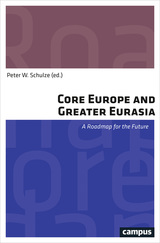
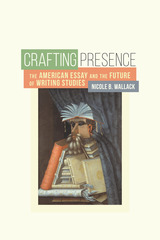
Wallack analyzes examples drawn primarily from volumes of The Best American Essays to illuminate the most important quality of the essay as a literary form: the writer’s “presence.” She demonstrates how accounting for presence provides a flexible and rigorous heuristic for reading the contexts, formal elements, and purposes of essays. Such readings can help students learn writing principles, practices, and skills for crafting myriad presences rather than a single voice.
Crafting Presence holds serious implications for writing pedagogy by providing new methods to help teachers and students become more insightful and confident readers and writers of essays. At a time when liberal arts education faces significant challenges, this important contribution to literary studies, composition, and creative writing shows how an essay-centered curriculum empowers students to show up in the world as public thinkers who must shape the “knowledge economy” of the twenty-first century.
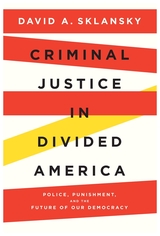
How a broken criminal justice system has fueled the crisis of American democracy, and how we can address both problems together.
American criminal justice is in crisis. Prisons are swollen, confidence in police has plummeted, and race- and class-based biases distort every aspect of the system. American democracy is in crisis, too, as the chasm of loathing and incomprehension that divides political factions grows ever wider and deeper. Legal scholar and former prosecutor David A. Sklansky argues that these crises are deeply intertwined. And if the failures of American criminal justice are near the heart of our political divides, then reforming the system is essential for repairing our democracy.
Criminal Justice in Divided America shows how police, courts, and prisons helped to break American democracy and how better approaches to public safety and criminal accountability can help to repair it. Engaging critically with concerns from both the left and the right, Sklansky lays out a clear and deeply researched agenda for reforming police departments, prosecutors’ offices, criminal trials, and punishment. Sklansky seeks pragmatic solutions that take account of political realities: the lofty ideal of empowering “the people” or “the community” can mean little when members of the public or the community disagree. While efforts to “defund” the police have exacerbated political conflicts without addressing the underlying problem of how and when force should be used to protect public safety, reforms aimed at improving police accountability, restraining prosecutorial power, and expanding the role of juries can bring together warring parties who share a concern for justice.
Ultimately, Sklansky argues, reform must be rooted in a strong commitment to pluralism—bridging political divides rather than worsening them, strengthening democracy, and securing the broad support that enables durable change.
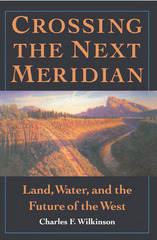
In Crossing the Next Meridian, Charles F. Wilkinson, an expert on federal public lands, Native American issues, and the West's arcane water laws explains some of the core problems facing the American West now and in the years to come. He examines the outmoded ideas that pervade land use and resource allocation and argues that significant reform of Western law is needed to combat desertification and environmental decline, and to heal splintered communities.
Interweaving legal history with examples of present-day consequences of the laws, both intended and unintended, Wilkinson traces the origins and development of the laws and regulations that govern mining, ranching, forestry, and water use. He relates stories of Westerners who face these issues on a day-to-day basis, and discusses what can and should be done to bring government policies in line with the reality of twentieth-century American life.
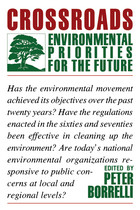
The environmental movement today is at a critical crossroads. Crossroads: Environmental Priorities for the Future is an in-depth assessment of the movement's successes and failures, and also offers prescriptions for the future. It includes contributions from some of the country's top environmental leaders and activists, including Barry Commoner, Stewart Udall, William K. Reilly, Gus Speth, Jay Hair, Lois Gibbs, Michael Frome, Chuck Little, and William Futrell.
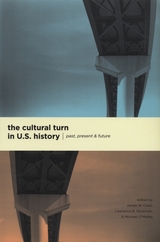

READERS
Browse our collection.
PUBLISHERS
See BiblioVault's publisher services.
STUDENT SERVICES
Files for college accessibility offices.
UChicago Accessibility Resources
home | accessibility | search | about | contact us
BiblioVault ® 2001 - 2025
The University of Chicago Press


